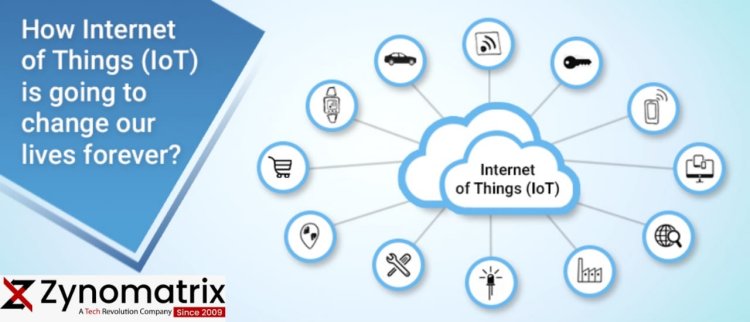The Internet of Things (IoT) and Its Impact on Our Lives
The Internet of Things (IoT) refers to a vast network of interconnected physical devices, vehicles, appliances, and other objects embedded with sensors, software, and connectivity capabilities. These devices can collect and exchange data, enabling them to communicate and interact with each other and with the broader digital ecosystem.

Introduction:
The Internet of Things (IoT) has emerged as a revolutionary technological concept that has the potential to transform various aspects of our lives. With its ability to connect everyday objects to the internet and enable them to communicate and exchange data, the IoT is reshaping industries, enhancing efficiency, and improving the way we interact with the world around us. In this blog, we will explore the impact of the IoT on different sectors and delve into its potential benefits and challenges.
2. Smart Homes and Connected Living:
One of the most visible impacts of the IoT is in the realm of smart homes. IoT devices such as smart thermostats, lighting systems, security cameras, and voice assistants have made our homes more intelligent, convenient, and energy-efficient. We can control and monitor various aspects of our homes remotely, making our lives more comfortable and secure.
3. Healthcare and Wearable Devices:
The IoT has the potential to revolutionize healthcare by enabling remote patient monitoring, personalized treatment plans, and efficient healthcare management. Wearable devices equipped with sensors can collect and transmit health data, allowing healthcare providers to track patients' vital signs in real-time and provide timely interventions. This technology has the potential to improve patient outcomes, reduce hospital visits, and lower healthcare costs.
3. Transportation and Smart Cities:
IoT-enabled devices are transforming the way we travel and commute. Connected vehicles equipped with sensors and communication capabilities can optimize traffic flow, reduce congestion, and enhance road safety. Furthermore, IoT infrastructure plays a vital role in building smart cities, where interconnected systems monitor and manage utilities, waste management, and public services, leading to improved efficiency and sustainability.
4. Industrial Internet of Things (IIoT):
The IoT has disrupted traditional industrial processes by enabling advanced automation, predictive maintenance, and real-time data analytics. In manufacturing plants, connected machines and sensors can communicate with each other, optimizing production, reducing downtime, and improving overall efficiency. IIoT applications have the potential to revolutionize industries such as logistics, agriculture, energy, and more.
5. Enhanced Data Analytics and Decision Making:
The vast amount of data generated by IoT devices presents immense opportunities for data analysis and informed decision making. By collecting and analyzing real-time data from various sources, organizations can gain valuable insights into customer behavior, operational patterns, and market trends. This data-driven approach enables businesses to optimize processes, enhance productivity, and deliver personalized experiences to customers.
6. Challenges and Considerations:
While the IoT offers numerous benefits, it also presents challenges that need to be addressed. Security and privacy concerns are paramount, as the interconnected nature of IoT devices increases the vulnerability to cyber threats. Additionally, the proliferation of IoT devices may lead to compatibility and interoperability issues, requiring standardized protocols and frameworks.
What's Your Reaction?





















